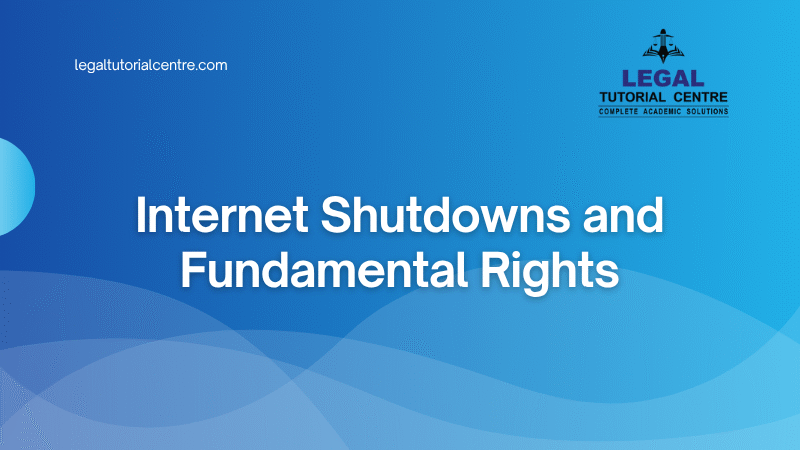With Reference to Anuradha Bhasin v. Union of India (2020)
Introduction
In the digital age, the internet has become a vital tool for accessing information, expressing opinions, conducting business, and enjoying basic rights. However, the use of internet shutdowns by the government, especially in sensitive or conflict-prone areas, has raised serious questions about the balance between national security and fundamental rights.
The landmark case Anuradha Bhasin v. Union of India (2020) brought this issue into sharp focus and established crucial legal principles about freedom of speech, press, and internet access in India.
2. Background of the Case
Petitioner: Anuradha Bhasin, Executive Editor of Kashmir Times
Respondent: Union of India
Context: After the abrogation of Article 370 in August 2019, the government imposed a complete communication and internet shutdown in Jammu and Kashmir.
The petitioner challenged this action, arguing it violated her fundamental rights under Articles 19 and 21.
3. Issues Before the Supreme Court
1. Whether the freedom of speech and expression under Article 19(1)(a) and the right to carry on trade or profession under Article 19(1)(g) extend to the internet?
2. Whether the indefinite suspension of internet services is permissible under Indian law?
3. What are the procedural safeguards required for imposing internet shutdowns?
4. Judgment of the Supreme Court
The Supreme Court delivered a historic ruling in January 2020, making the following observations:
a) Internet as a Fundamental Right Tool
The freedom of speech and expression under Article 19(1)(a) and the right to carry on trade or profession under Article 19(1)(g) include the right to access the internet.
The internet is essential to exercise these rights, especially in the modern world.
b) Restrictions Must Be Lawful
Any restriction on fundamental rights must meet the three-fold test:
1. Legality – Must be backed by law
2. Necessity – In the interest of a legitimate aim (e.g., public order)
3. Proportionality – Measures must not be excessive or arbitrary
c) Publication of Shutdown Orders
All government shutdown orders must be published to ensure transparency and allow legal challenge. d) Indefinite Suspension Not Allowed
The Court held that indefinite internet suspension is not permissible. Temporary measures must be reviewed every 7 days by a Review Committee as per the Temporary Suspension of Telecom Services (Public Emergency or Public Safety) Rules, 2017.
5. Impact and Significance of the Judgment
Recognized the importance of the internet in exercising fundamental rights in the digital era.
Put constitutional limits on the government’s power to impose internet shutdowns.
Strengthened freedom of the press, especially in conflict zones.
Empowered citizens to challenge arbitrary internet bans in court.
Promoted transparency and accountability in the use of executive power.
6. Criticism and Limitations
The Court did not immediately restore internet services in Kashmir but left the decision to the government.
Critics argue that the ruling lacked strong enforcement mechanisms, leading to continued misuse of shutdown powers.
Despite the judgment, India remains one of the top countries for the number of internet shutdowns globally.


